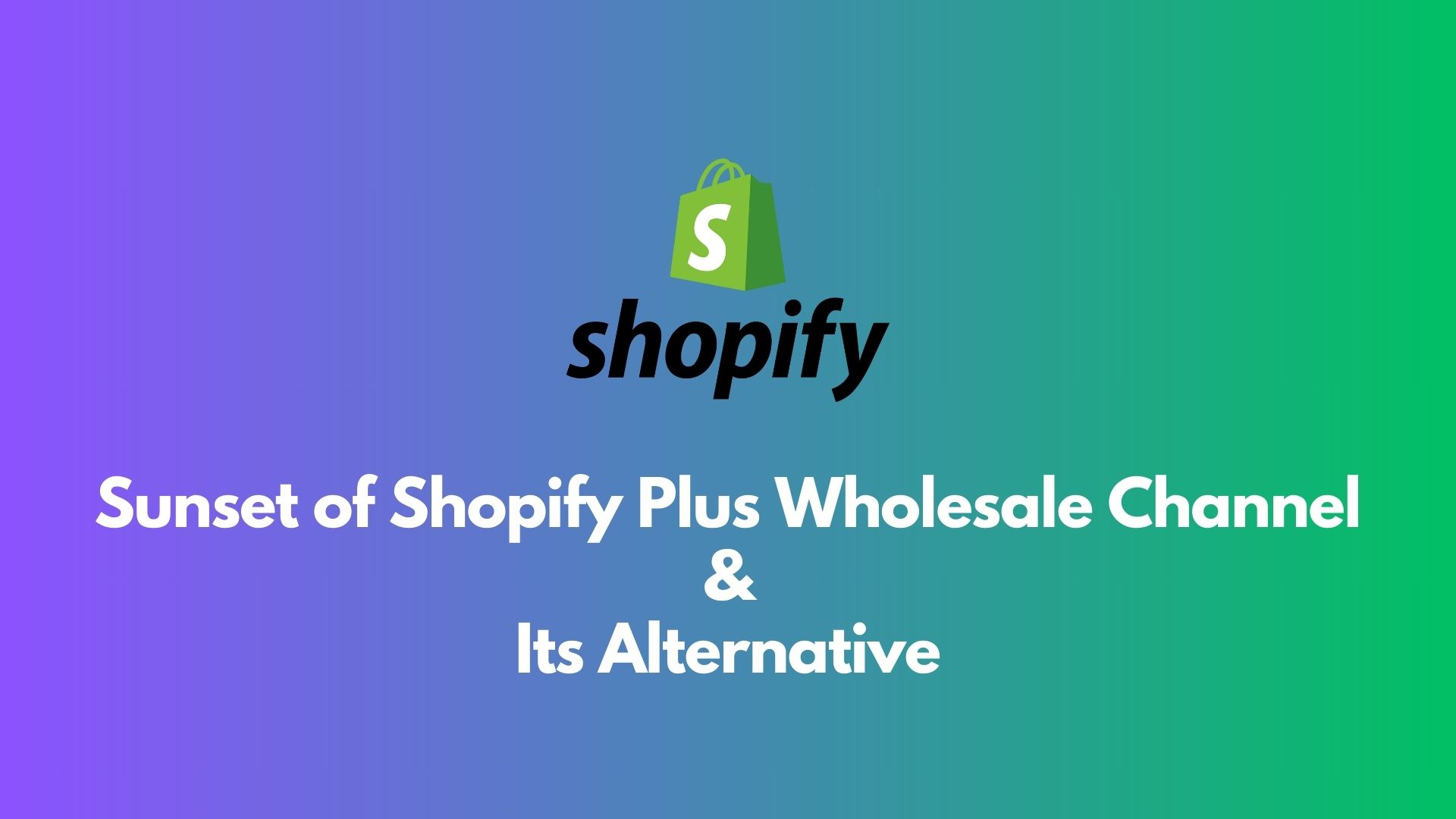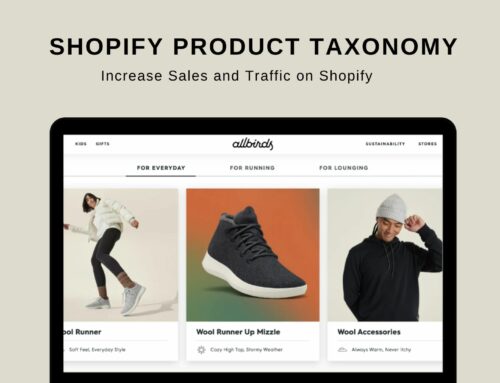Shopify offers two main channels for managing wholesale sales: the Plus Wholesale Channel and the B2B Channel. The Plus Wholesale channel, which was established to sell products in a larger amount, ended up in April 2024 as being limited by the removal of cookies from browsers controlled by the controllers. This is then the end of the platform, that was currently utilized for supplying Maslow’s products in bulk for retail customers. But fear not! Shopify offers another alternative: the B2B channel is where we have to channel our efforts.
This section takes a look at the sunset of the Shopify Plus Wholesale Channel and why you should consider transitioning to the B2B Channel for a successful future in your business’ wholesale cycle. Now, let’s get started!
Contents
- 1 Why is Shopify Plus Wholesale Channel Sunset?
- 2 Shopify’s Alternative Solution for Plus Whole Channel: B2B on Shopify
- 3 BSS B2B/Wholesale Solution App: Another Potential Alternative Solution for Plus Wholesale Channel
- 4 Conclusion – Shopify Plus Wholesale Channel Sunset
Why is Shopify Plus Wholesale Channel Sunset?
In April 2024, Shopify announced withdrawing their Plus Wholesale Channel plan. Such a decision breeds pondering about whether Shopify has other reasons behind its move and its effect on businesses whose wholesale activities had been conducted through this platform. Let’s delve into the why behind Shopify’s decision to deprecate the Plus Wholesale Channel and explore what this means for businesses that were relying on it:
What is Plus Whole Channel on Shopify?

The Plus Wholesale Channel on Shopify was a platform designed for businesses to sell their products in bulk to wholesale customers. It functions as an independent sales channel on the Shopify platform, operating separately from the core features available in your DTC store.
To use the Plus Wholesale Channel for B2B purposes, you will need to create a separate store and have limited options for storefront themes. Nevertheless, you can conveniently manage and monitor all orders and customers from the same admin interface used for your DTC store.
When & Why Shopify Deprecates the Plus Wholesale Channel?
On April 30, 2024, Shopify stopped the operation of the Wholesale Channel as part of the old Plus plan. The deconfiguration was the main barrier because of the limitations that were in place due to changes in the Google Chrome protocols of third-party cookies.
The Plus Wholesale Channel relied on these cookies to function properly, and as Chrome began phasing them out, Shopify decided to invest in a more future-proof solution: B2B on Shopify gives the convenient way to rely on the platform while maintaining independence and control in business transactions.
To sum up, sellers who used the Wholesale Channel before will need to find other ways such as new platforms or solutions in order to keep their B2B operations well. On top of that, they also look at their options on what best way and which method is the most appropriate.
Impacts on Shopify Businesses Relying on Plus Wholesale Channel
- Disruption to workflow: Migrating from a familiar platform to a new one can disrupt established workflows. Businesses may need to re-learn processes for managing products, orders, and customer interactions within the B2B Channel.
- Data transfer: Transferring product information, customer data, and order history to the B2B Channel might require additional effort, potentially causing temporary data accessibility issues.
- Loss of functionality: While the B2B Channel offers a more robust solution, some functionalities specific to the Plus Wholesale Channel might be missing, requiring adjustments to existing workflows.
However, the sunset shouldn’t be seen solely as a negative. Here are its positive alternatives:
- Enhanced functionality: The B2B Channel offers a more intuitive and user-friendly experience for both businesses and their wholesale customers.
- Greater scalability: The B2B platform is designed to handle larger order volumes and complex wholesale operations more effectively than the Plus Wholesale Channel.
- Improved integrations: The B2B Channel allows for seamless integration with third-party business apps and ERP systems, streamlining business processes.
The B2B sales landscape is undergoing a significant shift towards a more digital, buyer-centric approach. In the upcoming section, we’ll give some trends for B2B sales interactions.
Overview of B2B Sales Interaction Trend

Companies are investing resources in their sales talent to drive profitable growth and outperform competitors. A customer-centric approach is becoming increasingly important, with improvements in channels, technology, talent, incentives, and culture.
According to Gartner, the vast majority (80%) of B2B sales engagements are projected to occur online by the year 2025. With businesses aiming to expand through self-service transactions and personalized branding, a direct-to-consumer (DTC) style purchasing journey for wholesale customers is increasingly becoming standard practice. These trends suggest an exciting future for B2B sales, marked by enhanced efficiency, effectiveness, and personalization of the sales process.
That’s the reason Shopify has streamlined the solution on its platform and added customization options traders expect from the B2C model, such as custom themes, functions, and discounts. This wipes out a huge chunk of the amount of work between B2B partners making the selling process less complicated.
In the following part, explore Shopify’s Alternative Solution for Plus Whole Channel: B2B on Shopify, from its pros and cons to its possible alternative solutions, closes.
Shopify’s Alternative Solution for Plus Whole Channel: B2B on Shopify
The recent closure of the Shopify Plus Wholesale Channel (April 30, 2024) might leave some businesses concerned. Fortunately, Shopify has introduced a robust alternative: B2B on Shopify. This new platform offers a more comprehensive and future-proof solution for managing your wholesale operations.
What is B2B on Shopify
B2B on Shopify is an excellent choice for managing your B2B wholesale business efficiently.

B2B on Shopify: Features & Functionalities
B2B wholesale platforms offer a suite of features specifically designed to streamline and optimize your business-to-business sales. Here’s a breakdown of some key functionalities to look for:
- Blended store: Blended store can be created to cater to both business customers and direct-to-consumer (DTC) customers.
- Dedicated store: You have the option to create a specialized expansion store exclusively catering to business customers.
- Companies: B2B customers are represented by companies, which have their own profiles that include contact permissions, payment terms, catalogs, and tax exemptions. You can assign multiple contacts and locations to a company profile.
- Catalogs: Customer-specific catalogs or percentage-off prices can be set for all products and variants, and these catalogs can be assigned to specific company profiles.
- Custom pricing offered to B2B customers: Once catalogs and companies are set up, B2B customers are automatically offered custom pricing when they log in to their customer profile on your online store, eliminating the need for a separate storefront login.
- Payment terms: Billing with terms requires a manual process like assigning payment terms to orders or drafting orders to be automated. Payment Conditions can be stored in the Company Profile, so it is effortless to track down, sort out, and receive payments against orders once they are due.
- B2B checkout: Customers don’t miss out on the fact that the payment terms they receive, payment methods they can use, and main discounts are solely available at checkout time. These checkout systems have the choice to include the purchase order number, too.
- B2B customer accounts: To access wholesale information and catalogs, B2B customers must log in using a one-time code sent to their email. Once authenticated, customers can manage their accounts, select the company location they’re purchasing on behalf of, edit customer information, and view and filter their order history.
- Purchase order number: For B2B orders, purchase order numbers can be added, edited, or viewed on the order details page.
- B2B headless commerce: Headless commerce is supported in B2B, allowing developers to create B2B experiences in both blended and dedicated B2B stores.
Differences Between B2B on Shopify and Shopify Plus Wholesale Channel
The core differentiator between Shopify Plus Wholesale Channel and Shopify B2B Commerce via e-commerce is B2B transaction centricity. Shopify Plus Wholesale Channel caters to the needs of wholesalers by embedding the Wholesale Channel in the main Shopify platform. This enables ample customization like the ability for customers to place bulk orders wholesalers’ pricing lists, and customized catalogs among many others.
On the other hand, Shopify B2B provides a larger variety of B2B functionalities that are not restricted to only wholesale, such as custom pricing, company management, and personalized purchasing experience.
Here’s a comparison table for differences between the Plus wholesale channel & B2B on Shopify:
| Plus wholesale channel features | B2B on Shopify offerings currently |
| Additional price list types | B2B catalogs in Shopify serve as the counterparts to price lists. Gain a deeper understanding of B2B catalogs and explore the existing disparities between catalogs and the Plus wholesale channel price lists. |
| Minimum order totals |
In the plus wholesale channel, you may set up a minimum purchase requirement in terms of the total amount the customer will spend. While the functionality is not available as of now, through ballot applications, 3rd party apps, or through checkout meta field, you can attain the same result.
|
| Product-level quantity rules and volume pricing |
The Plus wholesale channel gives customers the freedom and flexibility to put together their mix of different types to achieve the minimum purchase amount. It is done with a product-level order of quantity rules and discounts for product purchases which customer afterwards always gets. It should be stated that the price rules for wholesale, though they are not offered on the platform at the moment, you can set the price rules, for volumes, at the product variation level.
|
Advantages and Disadvantages of Migrating to B2B Shopify Platform
The recent Shopify Plus Wholesale Channel sunset has prompted businesses to consider migrating to the new B2B on Shopify platform. This shift presents both advantages and disadvantages to consider:
Advantages of B2B on Shopify Migration
#1. More Customizable Features
The channels of the Plus Wholesale and B2B on Shopify are different because the Plus Wholesale Shopify’s Online Store uncodified features as they were for the B2B on Shopify, this includes Functions (replacing Scripts), discounts, themes, interface, and markets. Among other things, Shopify’s B2B also offers a simplifier user interface for merchants and B2B customers that increases their productivity by importing/exporting price lists and making reorders.
The Plus wholesale channel app does not feature integration with other apps, it lacks integration with ERP software, it does not allow for branding and design customization and it does not have the option to add custom options.
#2. 2 Different Store Types
Opt for one of two store options when using our latest B2B features:
- Establish a single, blended store that caters to orders from both aspects of your business. Also, it provides a seamless and consistent branding experience for all customers.
- Construct a separate B2B-only expansion store that provides enhanced customization tailored to your wholesale operations.
#3. Increases Efficiency
#4. Integrates with Business Apps
Disadvantages of B2B on Shopify Migration
#1. Potential limitations in addressing specific B2B needs
- Order Line Limit: In the B2B system, orders are limited to a maximum of 500 line items. This means that if a customer attempts to place an order with more than 500 different products or variants, the order will not be successful.
- Catalog Limit: Each company location has a maximum limit of 25 catalogs that can be assigned to them.
- Feature Unavailability: Some features are currently not available for B2B orders. These features include discounts, Shopify Scripts that affect line item discounts, purchasing with gift cards, and recovering abandoned checkouts. If these features are required, it is necessary to contact Shopify Plus Support to activate them.
#2. Challenges in adapting to a new platform and workflow
-
Subscriptions Incompatible: Subscription is not the path for B2B or enterprise purchases, so, it is critical to go for alternative solutions for those who have this transition.
-
Third-party Apps Compatibility: B2B is going through a throwing evolution process and a few third-party applications that have not been updated to align with B2B may still be lacking in their integration. It is better to have in mind this decision while selecting and applying it.
BSS B2B/Wholesale Solution App: Another Potential Alternative Solution for Plus Wholesale Channel
About BSS: B2B/Wholesale Solution App
- Free plan available and 14 days free trial
- Rating: 4.8/5 positive
- Developer: BSS Commerce
- Pricing: Basic plan $19 per month – Advanced plan $39 per month – Enterprise $89 per month
 The Wholesale for B2B /Wholesale solution offered by BSS Commerce is the complete wholesale operational solution for businesses that want to refine them. This allows the B2B customer to find and select what they want and take care of the necessary tasks such as ordering, billing, and any required customer service, which maximizes the extraction of valuable data from the wholesale customer.
The Wholesale for B2B /Wholesale solution offered by BSS Commerce is the complete wholesale operational solution for businesses that want to refine them. This allows the B2B customer to find and select what they want and take care of the necessary tasks such as ordering, billing, and any required customer service, which maximizes the extraction of valuable data from the wholesale customer.
👉 Try App Now: BSS: B2B/Whole Solution
Why Is It Another Potential Alternative Solution for Plus Wholesale Channel?
The Shopify Plus Wholesale Channel’s discontinuation (April 30, 2024) left a gap for businesses that relied on it for B2B sales. While B2B on Shopify is a strong alternative offered by Shopify itself, BSS B2B/Wholesale Solution plays a crucial role as another potential solution for several reasons:
- BSS Commerce offers unique features that cater to specific B2B needs. We comprehend the intricacies of pricing structures for wholesale clients and have devised methods to exhibit pricing for direct consumers on the storefront.
- Easy to handle customers through the registration form and automatically categorize them in the backend
- Tailor customization options to suit wholesale operations
- Enhance the API to facilitate the uploading of multiple rules for custom pricing and price-lists, as well as to differentiate catalogs for B2B customers.
- Handle tax regulations from different countries: The app can display tax, and exempt tax for users from assigned markets. Follow the tax regulations with specified industries such as wine/liquid, household appliances, service, etc.
- Existing Shopify integration: Similar to B2B on Shopify, BSS integrates seamlessly with your existing Shopify store. This minimizes disruption to your workflow and allows you to leverage familiar functionalities within the Shopify platform.
Therefore, BSS B2B/Wholesale Solution offers a strong alternative for businesses seeking a solution specifically designed for B2B needs within the Shopify environment, potentially at a more cost-effective price point.
Conclusion – Shopify Plus Wholesale Channel Sunset
In brief, the Shopify Plus Wholesale Channel sunset presents a significant challenge for businesses that have relied on the Shopify Wholesale Channel. The discontinuation of this service underscores the urgent need for businesses to find alternative solutions like B2B on Shopify, which offers a powerful alternative platform designed specifically for managing B2B transactions within the familiar Shopify ecosystem. Therefore, it’s crucial for businesses to not only identify but also thoroughly evaluate available options to ensure a seamless transition.
The post-sunset era may seem daunting, but it also offers an opportunity for businesses to adapt and innovate. Thanks to exploring new avenues and making informed decisions, businesses can continue to thrive in their B2B operations, turning the sunset of the Plus Wholesale Channel into a new dawn of opportunities.




